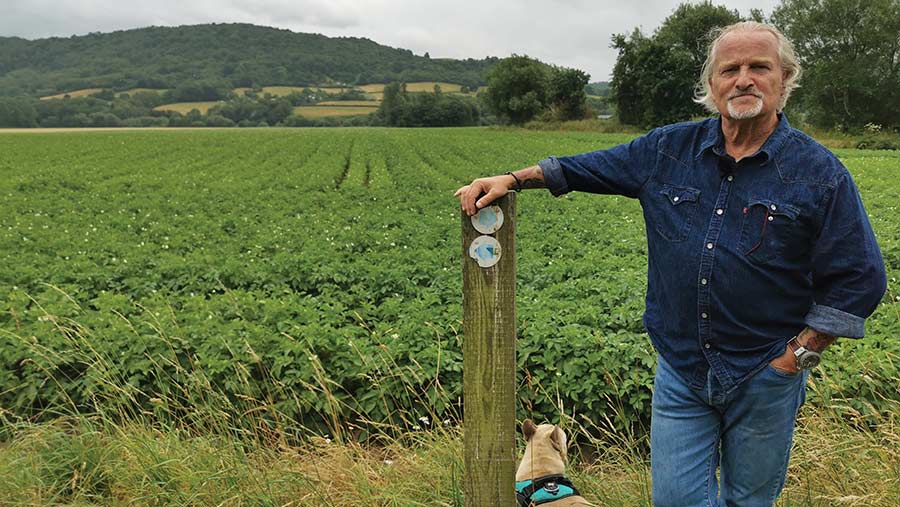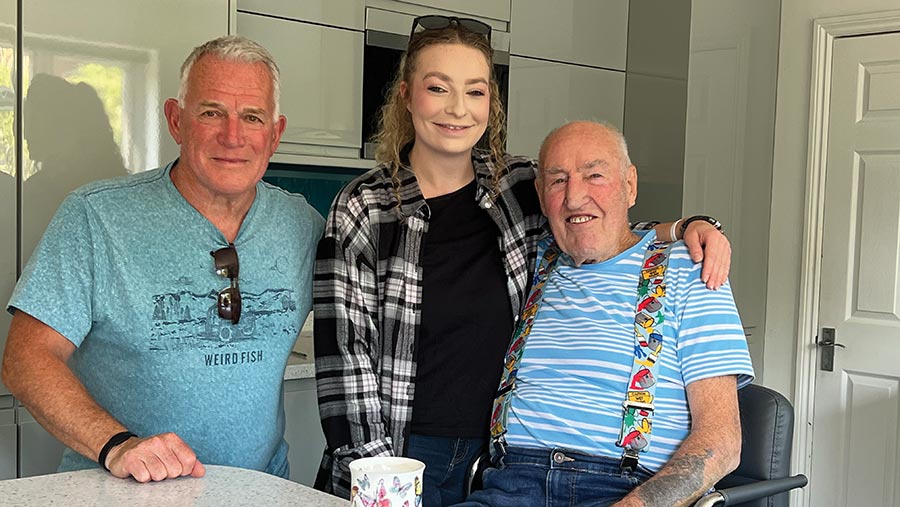Video: Former SAS soldier on a mission to combat rural crime
 Mick Hawkes © MAG/Philip Case
Mick Hawkes © MAG/Philip Case Ex SAS soldier Mick Hawkes spent four years breaking into farm complexes under cover in Northern Ireland to combat the IRA.
The covert operations mainly involved working against terrorism, looking for hidden devices, weapons and explosives.
Mick and his military colleagues would spend days “doing lots of recce” before they did the move on the farm itself.
See also: Farmers Weekly Podcast Ep 160: How are police tackling the rural crime wave?
During this time, Mick got clued up about all the security systems on farms and how to breach their defences.
He later ended up teaching Close Target Recce (CTR) for two years to special forces personnel who were headed over to Northern Ireland.
Mick summarises some of his farm security solutions in the video below.
Changing mindsets
Now, Mick is seeking to put his experiences to good use, albeit in a different way, by helping farmers to change their mindsets towards rural crime, understand how criminals operate and correct any security weaknesses on their farms.
The father-of-four spent 22 years working in corporate security following 24 years of military service.
After returning to rural Herefordshire in May 2022, Mick soon realised rural crime had become a significant problem and there was an opening for him and his daughter, Keely, to set up Hawkes & Co – a new company specialising in farm security and situational awareness among young people in schools and colleges.
“I want to keep Hawkes & Co as a small entity. We are not money- driven, we are driven to help people,” he says.
“If we can stop kids getting stabbed and farmers getting ripped off then for me, that’s job done.”
Mick says his company’s ethos is to help farm businesses improve their security by focusing on cost-effective solutions, rather than selling expensive security systems.
“If we can get the mindset of farmers and their workers right initially to think about security, that is a major bridge.
“That costs nothing. All that costs is the time we do the training and then a security assessment,” he explains.
Prevention measures
Thereafter, any recommendations will be cost-effective, and bigger expenditure on crime prevention measures – such as CCTV or lighting – will only be recommended as a last resort on farms that face specific crime problems.
“We are not there to make money off the back of farmers by recommending ridiculous security upgrades,” he adds.
“The emphasis for us really is understanding that everybody is on a budget these days.”
Mick and Keely also offer personal safety training for farmers, their workers and families.
Keely is being trained by two former SAS veterans – security consultant Richard “Ginge” Johnson in BTEC Level 2 Conflict Management, and Lofty Wiseman, the renowned survival instructor – in situational awareness.
She has also received training in self-defence.
Keely trains young people and adults in security and situational awareness, and rape prevention.
Her expertise is in “breakaway”, which is how to escape the clutches of a criminal and out of harm’s way.
The rise in animal rights extremists breaking into farms is an increasing threat, but the situational awareness training offered by Hawkes & Co can help farmers to tackle this.

Richard ‘Ginge’ Johnson, Keely Hawkes and Lofty Wiseman © Hawkes and Co
Farmer defence
Asked what spurs him on to combat rural crime and crooks in general, Mick says: “I hate criminality with a vengeance. There are too many criminals in this world looking to take advantage. I have always stood up to bullies.
“We are starting up this new entity with the ethos of helping people, not ripping people off.
“We believe the farmers and the farmworkers are the first lines of defence against criminality – not technical security or fancy gadgets.”
For more information about the security consultancy, visit hawkesandco.uk.
Mick Hawkes’ 11 farm security solutions to thwart rural thieves
1. CCTV and lighting
A plan should be put in place first. It is a tool to help you stay safe. There are two types of CCTV: overt and covert.
Hidden cameras in a rock or in hedges can be very effective as people don’t know they are there.
You are trying to catch criminals before they put their hoods or balaclavas on.
2. Movement sensors
Another useful security aid, movement sensors trigger an alarm or CCTV directly to your phone, so you know someone has crossed that beam who should not be there.
The downside is that beams can also be triggered by animals, which puts off some people from deploying them.
3. Signage
Good signs include: “CCTV in operation 24/7”, “Caution guard dogs on control”, “Dogs loose, do not enter”.
Having guard dogs loose in a farmyard at night is a big deterrent for criminals.
Put up signs in places where you keep machinery, too.
4. Alarms
Normally used in conjunction with CCTV. You can put an electronic barrier around a door and as soon as someone breaks the barrier, it will trigger an alarm.
Covertly, it can send a signal to a security company or police station, or start CCTV recording.
5. Barriers and fencing
Make sure gates are operative and difficult to open, especially at night.
Many gates can be easily lifted or off their hinges. That’s one of the biggest pitfalls of farm gates.
Some farmers spend a fortune on fancy gates, but will put a £10 lock on them, which is nonsensical.
The main entrance should be a double gate or gate mechanism, so imposters cannot drive into the main compound.
A coded entrance on the gate is ideal, if you can afford it.
6. Fuel and heating oil theft
Fuel and heating oil has to be placed in a restricted area, protected by CCTV and/or lighting.
Barriers and cages around fuel tanks are a good idea, but are only as good as the locks placed on them.
Farmers can also consider disguising fuel tanks to make them less obvious.
Treat fuel as a very expensive commodity along with your machinery. It’s all about the “onion effect” – layers of security.
7. Data-tagging and security marking
Every bit of kit owned should be data-tagged, photographed, recorded and sent to the police.
Data-tagging does not prevent theft, but if your kit is stolen and there is a record, you have a greater chance of getting it recovered.
Keeping a record is very helpful for insurance purposes, too.
8. Machinery
All shiny equipment – combine harvesters, tractors and trailers – should be out of sight and kept under lock and key when not in use.
There is a lot of complacency over machinery security. If you leave the keys in the ignition, it will go missing.
Leaving machinery out in the open in fields when not in use is asking for trouble.
Trailers can be hooked up and removed in a matter of seconds.
9. Vehicle tracking devices
Every farm vehicle should have a tracking device or GPS tracker fitted.
But these are only as good as the response to the alerts triggered.
If the police are unavailable to respond, farmers must not break the law by entering premises to recover stolen vehicles themselves.
The police will arrest farmers if they cross that line.
10. GPS thefts
Farmers should follow the same guidance for theft of global positioning system (GPS) kit as looking after their machinery – think out of sight, out of mind.
Don’t leave things in the open. GPS screens and domes are highly sought after by criminals because they are easy to steal, of high value and can be moved on in a heartbeat.
11. Communications
Consider using Signal or Wickr Me apps, rather than Whatsapp, to share intelligence on rural crime.
Settings can be changed to automatically delete messages once read.
It is a secure way of contacting a group of farmers with confidential information.
Who is Mick Hawkes?
Mick Hawkes spent 24 years in the military, including eight years in Commando forces and 14 years in B Squadron, within the acclaimed 22nd Special Air Service regiment, more commonly known as the SAS.
After leaving the military aged 40, Mick spent 22 years in security management roles in high-risk countries, including Kazakhstan, Equatorial Guinea, Nigeria, Angola, Iraq and Afghanistan.
He retired from corporate security in May 2022 and returned to Hereford to write a biography called Life on the Edge.
The book, which is due to be released early next year, is aimed at people who have lost their way in life and want to get back on track.
Mick’s set up his security consultancy, Hawkes & Co, in partnership with daughter Keely.
Their business also specialises in farm security and situational awareness, helping rural residents to combat crime.
